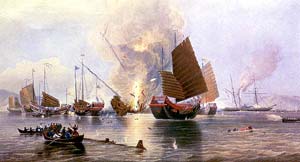In prehistoric periods,the shoreline of Hong Kong was inhabited.
Two Neolithic cultures have been found with fine pottery
and carvings that date to about 4,000 BC. During the Qin
Dynasty (221 - 206 BC) and Han Dynasty (206 BC - 220 AD),
people from the mainland came and settled in Hong Kong,
and coins of the Han Dynasty have been found in Hong Hong.
This area was an important trading and strategic region
for Chinese mainland during the Tan and Song dynasties (618
to 1279). After this period, the importance of Hong Kong
faded, and did not start attracting attention until the
19th century.
History of Hong Kong and Western Influence
The first westerner to visit Hong Kong was Jorge Alvares,
a Portuguese mariner, and he began trading with the Chinese.
Tea, silk and other Asian luxury goods were introduced to
europe by the Portuguese. During the 15th and 16th century
is when western influence came about in Hong Kong due to
the increased trade of Chinese products such as tea and
silk.
Chinese commodities such as porcelain, furnishings, silk,
tea, and other luxury good were popular in europe, but trade
to China suffered due to the fact that Chinese consumers
had little interest in foreign products. Silver was one
commodity the Chinese wanted, to the extent that the drain
on silver was affecting the european economy. Seeking other
commodities to trade with China, the British discovered
opium, and exploited its narcotic effects for economic gains.
Opium sales to the Chinese increased as purchase of Chinese
goods increased.
The Opium War and Hong Kong Island
The Chinese emperor banned the trade of opium in 1799,
but to no avail as smuggling came about. Import of opium
increased five fold from 1821 to 1837. In 1839, Lin Zexu
(in charge of ending opium trade) used force to destroy
foreign stocks of opium, and this was the start of the first
opium war. The Opium War was fought between Britain and
the Qing Empire from 1839 to 1842.

The British defeated the Chinese in mid 1842, and the opium
war ended on august 1842 when the Treaty of Nanjing was
signed. Under this treaty, China agreed to cede Hong Kong
Island to the British Empire. Under British rule, Hong Kong
prospered, but the tension between the Chinese and British
heightened. The second Opium War took place 1856 to 1860.
After the second Opium War, Kowloon Peninsula was ceded
to the British under the Convention of Peking. Kowloon and
the New Territories were leased to Britain for 99 years,
beginning July 1, 1898.
Return of Hong Kong City to Mainland
China In 1984, 13 years before handing Hong Kong back to China,
the British and the People's Republic of China signed a
Sino-British Joint Declaration, where the Chinese government
promised Hong Kong would maintain its capitalistic system
and life style under the "One country, Two System"
policy proposed by Deng XiaoPing. On July 1, 1997, Hong
Kong was returned to the PRC. |